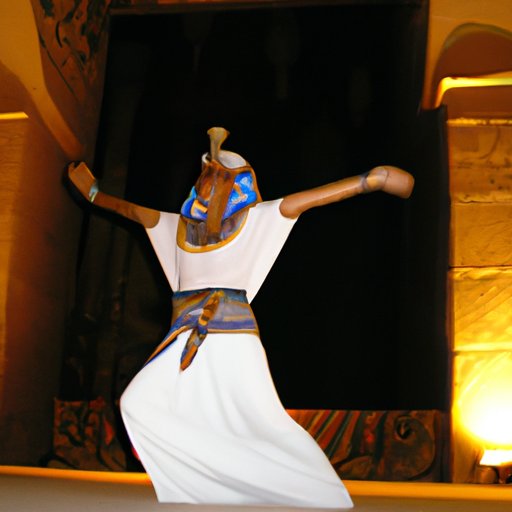Introduction
Egypt is a country with a rich and vibrant culture that dates back thousands of years. Its culture has been shaped by its long history, as well as by the influences of other cultures from around the world. This article will provide an overview of Egyptian culture and examine some of its key elements, including art and architecture, religious practices, music and dance, and language.
Historical Overview of Egyptian Culture
The culture of Egypt has its roots in ancient times, when the country was ruled by powerful Pharaohs. Ancient Egyptians were highly advanced in terms of art, architecture, and technology, and their legacy can still be seen today. The ancient Egyptians left behind many monuments and artifacts, which serve as reminders of their civilization.
In addition to its ancient origins, Egyptian culture has also been influenced by other cultures from around the world. For example, during the Roman period, Egypt was subject to foreign rule and this had an impact on its culture. Later, during the Arab conquest, there was a significant influx of Islamic influence into the country, which can still be seen today in terms of language, art, and religion.

Exploring the Cultural Significance of Ancient Egyptian Art and Architecture
Ancient Egyptian art and architecture are renowned for their grandeur and beauty. Examples of ancient Egyptian art include paintings, sculptures, jewelry, and pottery. These works of art often depicted gods and goddesses, as well as scenes from everyday life. In terms of architecture, the ancient Egyptians built massive monuments and temples, such as the Great Pyramids of Giza and the Temple of Karnak.
The art and architecture of ancient Egypt had symbolic meaning as well. For example, the pyramids were intended to represent the greatness of the Pharaohs, while the hieroglyphics used in art and architecture were meant to convey messages about the gods and the afterlife. In addition, certain symbols were associated with particular gods or goddesses, and were believed to bring good luck and protection.
Examining the Role of Religion in Egyptian Society
Religion has played an important role in Egyptian society for centuries. The ancient Egyptians believed in many gods and goddesses, and worshiped them through rituals and offerings. Today, Islam is the main religion in Egypt, although there are also Christians and other religious minorities. Religion is still an important part of everyday life, and many people observe religious holidays and take part in religious ceremonies.
The influence of religion can be seen in many aspects of Egyptian culture. For example, traditional dress is often modest and conservative, in accordance with Islamic beliefs. In addition, religious customs and beliefs have an impact on social interactions, such as the way people greet each other and show respect.

Investigating the Influence of Music and Dance in Egypt
Music and dance are integral parts of Egyptian culture. Traditional music is often based on folk melodies and is usually accompanied by drums, flutes, and strings. Popular genres of music include baladi (folk music), raqs sharki (belly dancing music), and sha’abi (popular street music).
Dance is also a popular form of entertainment in Egypt. There are various styles of dance, including belly dancing, folkloric dances, and modern dance. Music and dance are often performed at social gatherings, such as weddings and festivals. They are also used in storytelling and religious ceremonies.

Exploring the Impact of Language on Egyptian Culture
Language plays an important role in Egyptian culture. Arabic is the official language of the country, and it is spoken by the majority of the population. In addition, there are several other languages spoken in Egypt, including Coptic, Berber, and Nubian. English is also becoming increasingly popular, especially among younger generations.
Language has a significant impact on communication and interaction in Egypt. For example, knowing how to speak Arabic is essential for effective communication in the workplace and in social situations. In addition, language can also influence the way people think and express themselves, as words can carry different meanings depending on the context.
Conclusion
Egypt is a country with a rich and vibrant culture that has been shaped by its long history and the influences of other cultures. This article has explored some of the key elements of Egyptian culture, including art and architecture, religion, music and dance, and language. It is clear that these elements have had a significant impact on the way people live and interact in Egypt.
Overall, it is evident that Egypt’s culture is both fascinating and complex. From its ancient history to its vibrant present-day culture, there is much to explore and discover. By understanding more about Egyptian culture, we can gain insight into the lives of those who call this country home.
(Note: Is this article not meeting your expectations? Do you have knowledge or insights to share? Unlock new opportunities and expand your reach by joining our authors team. Click Registration to join us and share your expertise with our readers.)
